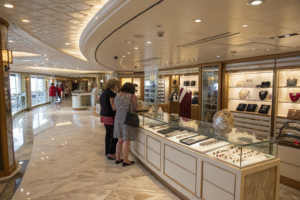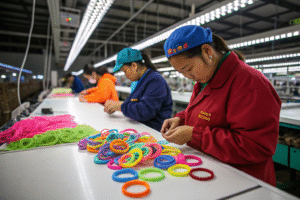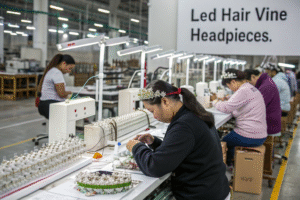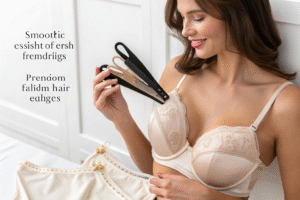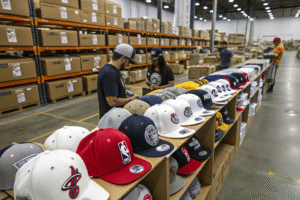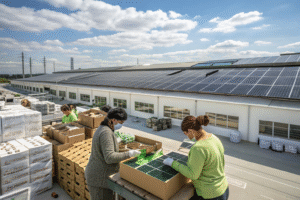As demand for fashion hair accessories grows, buyers are under increasing pressure to source responsibly. For scrunchies—a product often associated with fabric waste or low-cost labor—ethics aren’t just a bonus, they’re becoming an expectation. The truth is: your brand reputation depends on who and how you source from.
To ensure ethical sourcing when buying wholesale scrunchies, buyers must verify labor practices, check certifications, assess material origins, and work with transparent factories that support fair wages, environmental responsibility, and sustainable production.
In this guide, I’ll walk you through what we do at HairAcc to make sure your scrunchie supply chain meets both your brand values and customer expectations. These steps are not only practical—they’re essential in today’s global accessory market.
What labor practices should you verify?
Labor conditions shape the human cost behind each product.
Ethical scrunchie factories prohibit child labor, ensure fair wages, safe working environments, and follow national labor laws.

How can you ensure no child labor is used?
First, work only with factories that conduct regular third-party BSCI audits or SEDEX SMETA inspections. These audits check age verification records, time logs, and working conditions. At HairAcc, we make audit reports available upon request.
We also welcome buyer visits and surprise video audits—something many offshore resellers avoid.
Are wages and working hours monitored?
Absolutely. We follow Chinese Labor Law standards on pay, insurance, overtime, and working hours. Payroll is digital, with copies shared with auditing teams.
Our line leaders also get bonuses based on output and zero-complaint shifts—helping us retain skilled, motivated employees.
How do you trace the fabrics used in scrunchies?
The fabric supply chain is often opaque—and ethically risky.
Ethical sourcing starts with transparency about where and how fabrics are made. Look for OEKO-TEX, GRS, or organic certifications.

What fabric certifications should you request?
For eco-conscious buyers, request OEKO-TEX Standard 100 labels that guarantee textile safety. For recycled scrunchies, check if fabrics are GRS-certified (Global Recycled Standard). These help avoid greenwashing and confirm environmental integrity.
At HairAcc, we stock OEKO-TEX certified poly satin and GRS RPET jersey fabrics ready for production.
Can you trace fabric origins by batch?
Yes, and it’s important. Each roll of fabric we receive is logged in our ERP system by lot number and mill ID. We can trace most batches back to approved textile mills within China. For large projects, we provide chain-of-custody reports to track the entire material journey.
What environmental practices should be in place?
Scrunchies are small—but high in environmental footprint if poorly made.
Factories should minimize waste, avoid harsh chemicals, and use low-impact dyes, energy-saving machines, and recyclable packaging.

How is textile waste managed?
We recycle over 70% of our cutting room fabric scraps into stuffing or new trims. Buyers can even request “zero waste” scrunchie lines, using offcuts from other orders. Some brands also prefer deadstock fabric to reduce overproduction.
We track waste by order and report back to clients looking to meet CSR or ESG targets.
What chemicals or dyes are safe?
We use AZO-free dyes and comply with EU REACH limits on heavy metals and formaldehyde. Our dyeing partners use closed-loop systems to reduce wastewater. Buyers may also request natural plant dyes for fully biodegradable fabric options.
How can buyers monitor ethics remotely?
Global buyers can’t always visit every supplier—but they can verify from afar.
Choose factories that offer remote audits, real-time documentation, and communication about ethical practices.

Are live video inspections available?
Yes, we offer scheduled live walkthroughs via Zoom or Teams, showing cutting, sewing, and packing lines in real time. This allows buyers to inspect conditions and track order progress ethically—especially useful for small brands without sourcing teams.
We also record footage for compliance archiving.
What files or records should buyers request?
Request digital access to audit reports, fabric test reports, MSDS sheets (for dye safety), and third-party inspection records. We organize these in Google Drive folders per PO for our clients, and update after each production run.
Conclusion
Ethical sourcing isn’t just a trend—it’s a business responsibility. For hair accessory buyers, it starts with choosing the right factory. From certified fabrics to clean labor practices and real-time transparency, ethical scrunchie sourcing is achievable when you know what to ask and verify.
At HairAcc, we welcome these conversations. We believe doing the right thing should be the standard, not the exception. When you buy from a factory that cares, your products carry more than just profit—they carry purpose.


